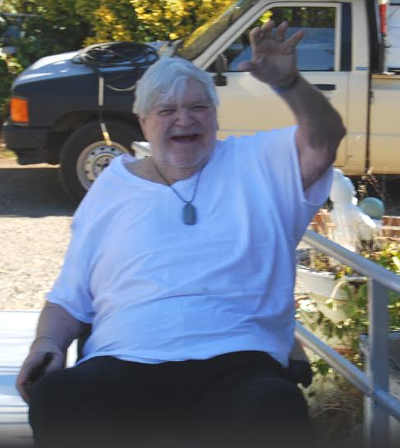LAKEPORT, Calif. – On Thursday a jury determined that a Kelseyville man who shot his estranged wife's friend and beat her severely in September 2011 was not guilty by reason of insanity.
Andrew James Serrano, 42, is now expected to spend time in a state mental hospital or other mental health facility instead of doing prison time for the assaults, which had followed a history of stalking, threatening and harassing his then-wife, Lesa, as well as several of her friends, including Willy Turner, who Serrano shot at point-blank range on Sept. 10, 2011.
“We were disappointed by that and disagreed with that,” Senior Deputy District Attorney Alan Upton, who prosecuted the case, said of the verdict.
Turner called the verdict – which included a finding of not guilty for his attempted murder – “disgusting and morally wrong.”
“I really can't wrap my head around this, that 12 people could come to that conclusion,” said Turner, who testified at the trial.
Lesa Koloff – Serrano's now ex-wife – said she also is disappointed with the verdict. “I do not feel it was just and I feel it was especially unjust for Willy.”
Katrina Hickey, a friend of Koloff's who – along with sister, Kayla – was stalked by Serrano and injured during an incident in which he rammed Koloff's SUV in Lakeport, said Serrano is evil.
“This has been a very hard three years and I am very disappointed in the outcome of the jury trial,” she said. “We have remained hopeful throughout this whole process that justice would be served and Andrew would be held responsible for the crimes he committed. I don't believe he is or was insane … I believe he is an angry, manipulating human being who selfishly tried to destroy the lives of others.”
She thanked the District Attorney's Office for its efforts, but said it's her belief that the justice system failed Serrano's victims.
Like her sister, Kayla Hickey emphasized the sense of injustice – and shock – they are experiencing as a result of the verdict.
“The whole thing is just too overwhelming,” Kayla Hickey said.
In early 2012 Serrano was ordered to stand trial on counts including the attempted murder of Turner; aggravated mayhem; simple mayhem; assault with a firearm; spousal abuse; criminal threats; false imprisonment; assault with a deadly weapon; hit and run; stalking; three misdemeanors relating to Serrano’s alleged violations of a domestic violence restraining order against his wife and civil restraining orders against him held by two of her friends; and special allegations involving personal use of a firearm, great bodily injury and potential strikes.
The charges arose from four separate events; besides the shooting, there was the July 2011 incident in which he rammed his wife's vehicle and separate counts for violating the restraining orders held by the Hickey sisters.
Serrano's trial was “bifurcated,” meaning, it was divided into two stages, one for guilt and one for sanity. The same jury heard both phases.
Serrano's attorney, Mitchell Hauptman of Lakeport, said jury selection began Aug. 27, with evidence beginning Sept. 11, just one day past the third anniversary of Turner's shooting.
In the guilt phase, the jury received the case on Oct. 2 and came back with verdicts on Oct. 8, Hauptman said.
At that point, the jury found Serrano guilty of most of the counts. However, they found him not guilty of attempted murder and leaving the scene of an accident, and they also deadlocked on the aggravated mayhem count, according to Hauptman.
The sanity phase – which applied only to the Sept. 10, 2011, shooting and the associated charges – began on Wednesday, with the closing arguments and jury deliberations taking place on Thursday, Hauptman said.
On Thursday the jury reached its verdict that Serrano was not guilty of those charges by reason of insanity. “They deliberated about two hours,” Hauptman said.
In speaking with the jurors, “They clearly felt he needed treatment,” Hauptman said, instead of a prison sentence.
Insanity cases like Serrano's are rare, according to Hauptman and Upton.
This was Upton's first such case, and in Hauptman's 36 years of legal practice, he said he's only gone to trial on one other case involving an insanity plea.
“The plea shows up in 1 percept of cases,” said Hauptman, noting that most are resolved by submission of reports to the court, with the number of actual trials very small.
“I don't think they're very common even nationwide,” said Upton.
The facts of the case
While Serrano's case culminated in the violent confrontation with Koloff and Turner, for some time beforehand he had been making threats to Koloff, and stalking her as well as the Hickeys. All three women had restraining orders against him.
His attempts at intimidation later focused on Turner. Serrano left Turner a January 2011 phone message and sent him a text in May 2011 telling him to stay away from Koloff.
Turner also said he saw Serrano driving through his neighborhood several times. During one incident, Serrano was speeding down Turner's street and had to slam on the brakes to avoid hitting Turner's son. Afterward, Serrano sped off.
A friend of Serrano's told investigators that Serrano had sent him texts that included pictures of handguns and said that Koloff was going to disappear. Investigators also believed he was using some kind of tracking device to monitor his wife's movements.
Koloff told Lake County News that Serrano took medication for depression for about a year prior to their separation, adding she believed he brought the depression on himself. “He had spent us into a hole we would never be able to get out of,” and she felt things were spiraling out of control for him.
She said Serrano had become threatening and aggressive beginning in 2010. She left in April 2011 after he became physically abusive, and she said at that point he began threatening her life.
She said he was arrested three to four times prior to the shooting. One of those times occurred July 2, 2011, when he was arrested for assault with a deadly weapon and hit-and-run after using his pickup to ram Koloff's vehicle.
That night, Serrano spotted Koloff and the Hickeys while they were having dinner at Renee's Cafe in Lakeport, circled the restaurant several times and then pursued them down Main Street when they left.
Serrano got ahead of Koloff's SUV, and as she tried to drive around him, he revved his engine and rammed her vehicle.
Katrina Hickey said she was injured in the ramming incident, and that she had been throwing up with fear as Koloff drove to the Lakeport Police Department afterward.
She said she received a temporary restraining order against Serrano after seeing him near the home she and her sister shared, and a permanent restraining order was granted after the ramming incident.
On Sept. 10, 2011, Koloff and Turner went to the Serrano home at 3050 Big Valley Road in Kelseyville – which she had moved from several months before – to retrieve some of her personal belongings, including clothing and furniture.
Serrano suddenly arrived, and when Koloff went to speak with him as he stood by the side door of his pickup, she saw he was loading a Glock .40-caliber handgun. According to court testimony, the gun had been bought for him – along with the ammunition – by a friend.
Koloff ran into the house and Serrano went around to the back porch, where he and Turner faced each other through a door window. He told Turner he needed to leave, and Turner replied that Serrano first needed to move his truck.
Serrano shot Turner through the door, with Turner recounting that the gun was less than 18 inches from him.
Turner said the bullet tore his lung 3 inches deep and 2 inches wide, with a doctor telling him there was no reason he should have survived. He said that today he has the use of about half of the injured lung due to scarring.
After shooting Turner, Serrano found Koloff hiding in the garage. He took her by the hair and dragged her outside, threatening to kill her, strangling her and hitting her repeatedly in the face, leaving her with serious injuries of her own.
The quick actions of several sheriff's deputies – Mike Curran, Andrew Davidson and Gary Frace – have been credited with saving the lives of both Turner and Koloff.
Turner called 911 after he was shot, and when Curran and Frace arrived on scene they drew their weapons and ordered Serrano to drop the handgun and get on the ground, taking him into custody. Davidson tended to Turner, trying to get the bleeding stopped and calling for an air ambulance.
In pursuing the insanity defense, Hauptman said there needed to be evidence of serious mental health issues existing sometime before the crimes occurred. He said Serrano had exhibited signs of serious mental illness in the months before his shooting.
“The defense has the burden of proof on the insanity phase,” said Upton.
Upton said the defense presented two experts while he presented one in the sanity phase.
In arriving at a verdict in the guilt phase, jurors must decide that the evidence is convincing beyond a reasonable doubt. However, in the process of seeking an insanity verdict, the defense only has to prove its case by the less rigorous preponderance standard, which Upton said means it is more likely true than not.
Upton said he did not speak with the jury after the verdict. While he was disappointed with the insanity verdict, he said the jury has spoken and now the prosecution must work with it and try to keep the community safe.
Serrano has remained in the Lake County Jail since his September 2011 arrest. Hauptman said Serrano's treatment in jail has been mostly based on medication, with a psychiatrist seeing him through a telehealth connection. He described Serrano as “zombie-like” due to the medications.
Hauptman said in a facility Serrano will be able to get therapeutic treatment. “The issues that he has are manageable.”
Koloff said she believes it's just a matter of time until her ex-husband “miraculously” becomes sane again.
Turner, who served in the United States Marines during the Gulf War, said of the verdict, “I’ve never been shaken this much in my life.”
He said he cried himself to sleep Thursday night – something he had never done before in all of his 45 years.
Turner said one of the conclusions he takes from the verdict is that the jury didn't consider him a victim of Serrano's violence.
The process ahead
Retired Judge Arthur Mann, who presided over the trial, is scheduled to sentence Serrano at 8:15 a.m. Dec. 8, Hauptman said.
Hauptman said that, considering the time Serrano already has spent in custody, along with any good behavior credits he may have, it's likely the amount of time he's already served is close to the sentence he would receive on the counts excluding the shooting incident.
While Mann will determine if any additional time is required on the counts Serrano was convicted of that don't involve the shooting incident, he will be guided in where Serrano's treatment will take place by recommendations from mental health authorities, Upton said.
Upton said the case file has been sent to the Lake County Probation Department, which will make a time calculation for Serrano's maximum commitment.
Hauptman said the process requires Mann to refer the case to a community program director, who will recommend in which hospital Serrano should be placed.
He said the court then has to determine whether to confine Serrano to a state mental hospital or a treatment facility.
Serrano will have to have to serve a minimum of 180 days in a state facility before the court can consider releasing him on an outpatient basis, Upton said.
Ultimately, how long Serrano stays in such a facility will depend on the assessment of his mental health and a complicated legal process, according to Upton and Hauptman.
“The judge is going to have to rely on reports from the hospital and treatment facilities,” said Upton.
He said the judge would then need to refer those reports a to local representative for the California Department of State Hospitals' Conditional Release Program, also known as CONREP.
Among the considerations would be determining if Serrano was returned to sanity and whether he posed a danger to the community. Upton said all of that would be contained within a hearing process that would include a notice to the District Attorney's Office, which in turn would give notice to the victims in the case.
Using the reports and recommendations as guidelines, a judge would have jurisdiction over whether Serrano is transferred to another facility or placed on outpatient status, Upton said.
Had he not been found insane at the time of the shooting, Serrano would be facing 25 years to life in prison for the mayhem conviction alone, Hauptman said.
Upton said Serrano could be kept in a mental facility for the maximum term of commitment – 25 years to life.
However, while that time period will play into options for the timing of his release – heavier restrictions will likely be assessed if he's released earlier – there is no way to know at this point how much time he will serve, based on statements by Upton and Hauptman.
“It’s pure speculation as to when he would be released,” said Hauptman.
Kayla Hickey said the victims in the case waited a long time to be heard.
“We watched Andy have all the rights, which was fine because we held out for hope the day would come when the jury would expose him for the monster he is and that was just not the case,” she said. “We will continue to live our lives but the sickening feeling I have as a result from this trial will not go away any time soon.”
Koloff said she still has fears for her family, including the three children she has with Serrano. “I do not want my children to live in fear and I try to keep things as calm as possible for them. I hope they are learning to be strong and to make the best choices they can with what life hands them. I know that the sting of what we are going through will lessen.”
She said she hopes this chapter in her lift will continue to give her strength for the other trials, “and I hope it gives others strength to fight their fights.”
Turner is “100-percent” concerned that Serrano poses a safety threat to him and his family.
“He got to make a choice for so many people,” said Turner, adding, “They took all the punishments away from his choice.”
When he woke up the day after the verdict, Turner said he decided to live his dream, commit himself to help others and will do the best he can for his family.
In moving forward with his own life, Turner's plans include Koloff, to whom he is engaged.
Koloff said the case will never leave her. “I will never understand how someone who is supposed to love and care for you can turn on you in such a horrific manner. Especially now that I have found someone truly opposite.”
They plan to marry Dec. 13, five days after Serrano is due to be sentenced.
Email Elizabeth Larson at This email address is being protected from spambots. You need JavaScript enabled to view it. . Follow her on Twitter, @ERLarson, or Lake County News, @LakeCoNews.



















